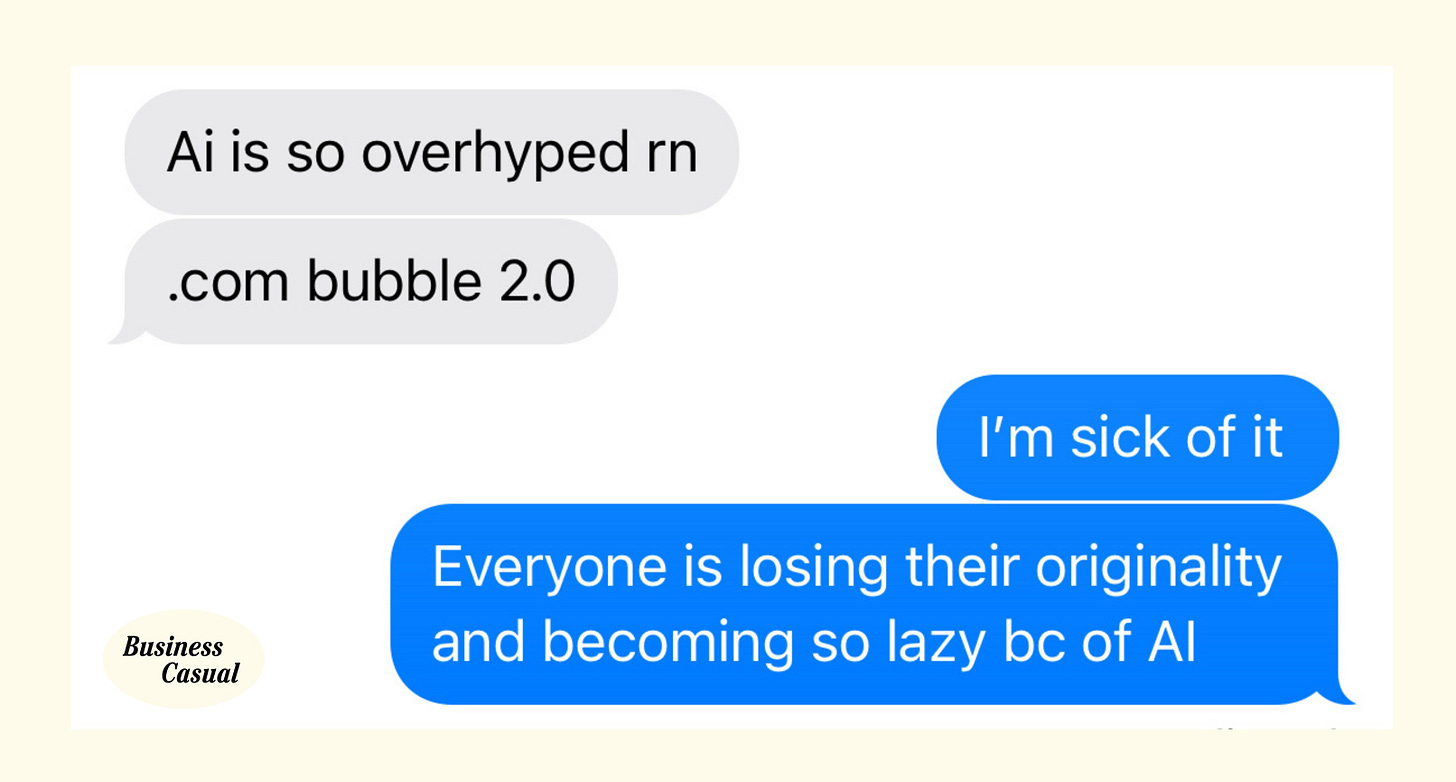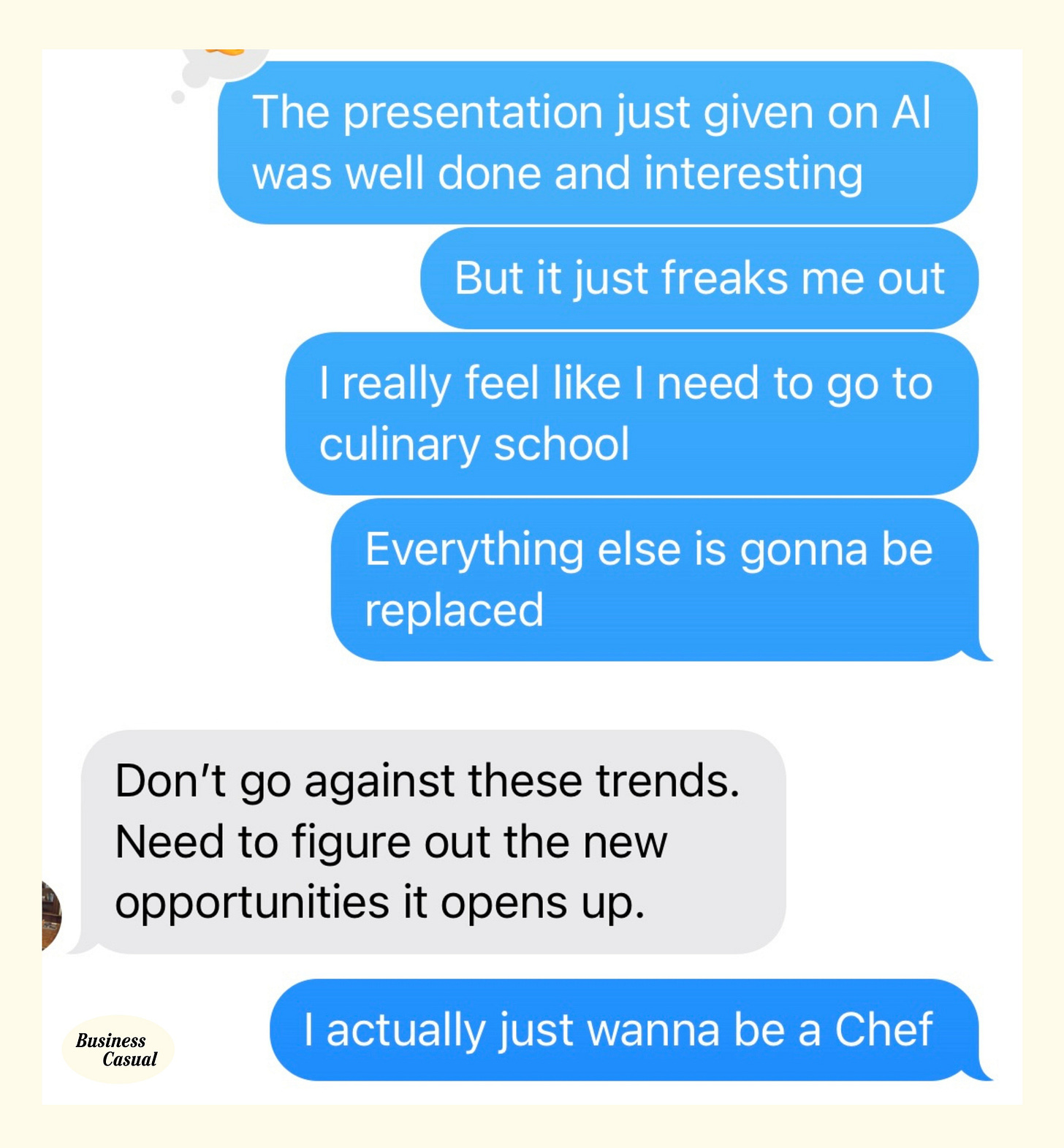Two years ago, my dad began warning me about the impacts of AI (as dads do). “It’s going to displace the majority of jobs,” he said. “There are existential risks,” he continued.
I mostly ignored him, because thinking about technology is a bit boring to me. I prefer to think about what constitutes the perfect dessert menu and the ideal venue for a destination wedding. I avoided most of the tools, and prided myself on maintaining my creativity, developing my own voice as a writer, and not letting my brain atrophy.

But then, all of a sudden, it felt like every headline I read had to do with AI (Joe Hovde wrote really resonantly about this last week). In the past two weeks alone, I’ve read articles about the “bottom rung of the career ladder breaking,” AI starting to “replace people,” and the “workers who lost their jobs to AI.” Business Casual is a newsletter about work and careers; I knew I could no longer ignore the giant elephant in the room, trampling over all career precedents and pathways with its heavy, merciless feet.
So today I finally heed my dad’s warnings and present the start of a series on AI and its impact on work. I won’t be offering tech analysis (I’m clearly not an expert), but rather will try to parse through, package, and present the bombardment of AI news in a way that’s a little less scary, and a little more understandable and actionable (this is as much for you, as it is for me). I will also share stories of real people being directly affected by this revolution — the paralegals and programmers we’ve all been (ominously) hearing about.
If you have any feedback — or are an expert on this topic and interested in collaborating — reply to this email or DM me through Substack. I’d love to hear from you.
AI is here to stay
The key takeaway
Businesses are already starting to replace people with AI. Right now, entry-level white-collar jobs are at greatest risk of being replaced.
The data and details
On May 28, Anthropic CEO Dario Amodei shared an alarming prediction that AI could eliminate half (50%) of entry-level white-collar jobs, causing unemployment to rise to 10-20% in the next one to five years.
This reality is already taking shape: many companies have already laid off workers and paused new job listings.
Last month, Microsoft laid off 6,000 workers (then some), amounting to 3% of the company. And Meta announced plans to reduce its workforce by 5% in 2025. (Side note: If you’ve been laid off recently,
is building a supportive and special community at ).
The latest unemployment data confirms these shifts and underscores that white-collar workers — and career starters in particular — are the first to face consequences:
The unemployment rate for college graduates has risen 30% since September 2022, compared to 18% for all workers.
At the same time, hiring rates for jobs requiring a college degree have slowed more than for other jobs.
How this is happening
AI agents can do the work of humans way faster and more cheaply, and they’re best at doing tasks previously assigned to entry-level employees (note taking, document review, elementary coding, etc.). Many companies already utilize AI agents and many more are adopting them now.
When I think back to my first job as a program associate in the Los Angeles Mayor’s Office, I spent many hours taking notes on COVID-19 press conferences and writing science briefings for the Mayor; now, there would be no reason to pay me to do these tasks — an AI agent would do them better and faster.
One of my friends, a manager at a major communications firm, told me this week that he uses AI to do things he previously would have assigned to an intern: “AI does it better, anyways.”
Some things to make you feel better
I studied economics in college, and one thing we learned is that unemployment predictions are just…predictions. I think it’s good that Amodei offered such an alarming unemployment forecast (people, like me, started to pay attention!), but there are so many other variables at play (immigration, a generation of retiring boomers, geopolitics) that could dramatically shift things. Take all predictions with a grain of salt.
This isn’t the first time the labor market has experienced a major shift: in the 19th century we had the Industrial Revolution, and in the 20th we had globalization. Both periods ultimately resulted in more jobs, not less.
My dad likes to remind me that as much as AI may result in job obsolescence, it also presents tremendous possibility and will create new roles and business opportunities. It’s important to adopt a mindset of abundance and consider AI’s potential as well as its risks.
This was a new type of newsletter for me, so thanks for sticking along! Leave a like or a comment if you found this useful, and share with any friends who might also be overwhelmed by the onset of AI.
In future AI letters, I plan to dig more deeply into which jobs are at greatest risk; offer practical resources and tips for preparing yourself for this transition; and share personal stories. Let me know if you want to read anything in particular. I value your feedback.






Being a chef sounds great :) your dad seems smart. Excited to follow along